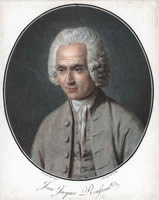Lesson Two: The Origins of Western Democratic Liberalism
2. Lesson 3.2.1 The Development of Classical Liberalism
The Development of Classical Liberalism
During the Enlightenment period in Europe in the 18th century, many questioned why a king got to rule without question (absolute monarchy). A concept called rule of law developed from this.
Basic Principles of the Rule of Law
The basic principle of the rule of law is that no one individual is above the law. Regardless of who you are, you are responsible for your actions. No individual is greater than the law.
As individuals began to support the idea of rule of law, many began to believe they were able to govern themselves and did not need a monarch or ruler. Liberalism is a concept that came from many great thinkers. These great thinkers studied the structure of society. From that study, they decided how society could best be served. Jean Jacques Rousseau, a liberal philosopher from the Enlightenment, felt that people should be able to choose their country's leader. He felt people should enter into a social contract with society.
Classical Liberalism
Classical liberalism is a political and economic term used to describe a period of time that began at the end of the 18th century (1700s) when European governments changed to interfere very little in economic decisions. Classical liberal thought developed from the values of individualism and the influential ideas of liberal-minded philosophers.
If you lived in a classical liberal world, you would have total freedom to choose how to live. You could choose what you thought your needs and wants are, and you would work your hardest to do the best you can. If everyone did this, classical liberals argued that then everyone would prosper and society would flourish.

Jean Jacques Rousseau